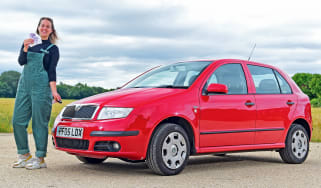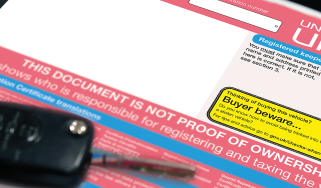New car buying trick could net you £8,000. But is it legal?
Buyers are paying off the balance of their car finance early to pocket big manufacturer deposit contributions for themselves. We talk to the experts to find out more

Car buyers have discovered a new trick which is saving them thousands of pounds. The clever customers are signing up for finance deals and then immediately cancelling and paying off the balance, with some gaining discounts in excess of £8,000.
The ZEV mandate has led several manufacturers to offer their cars with unprecedented deposit contributions to entice buyers.
For example, Ford is currently offering its Mach-E electric SUV with a staggering £7,500 deposit contribution, Mercedes is offering £6,500 towards a new EQA and Audi is trying to shift the Q4 e-tron with discounts as high as £8,325. It’s not just limited to electric cars, either; Nissan is currently giving buyers up to £3,250 towards a new Qashqai.
These deals are mainly only available to finance customers, allowing companies to recoup a portion of the hefty deposit contributions through accrued interest, but some buyers have discovered that you can actually exit the finance agreement early and pay the remaining balance off with cash. This essentially avoids any interest being due and nets the buyer the deposit contribution as a huge cash discount.
This trick is only possible thanks to what’s known as ‘cooling off’ periods, which are mandatory clauses in finance agreements that essentially protect the customer, providing them with a fixed period after signing in which to change their mind. Given that the deposit contribution is submitted at the beginning of the credit agreement, buyers can cancel the finance during the cooling off period and not pay a penny in interest.
Auto Express approached Volkswagen Financial Services, which is currently offering huge discounts on its line-up of cars – the ID.4 SUV, for example, is currently available with a hefty £5,500 deposit contribution – to see how manufacturers are reacting to this new trick.
A VW spokesperson told us: “The 14-day withdrawal period offered under UK regulation is there for peace of mind and we don’t promote the use of this cancellation period for short-term benefit as it may impact a customer’s credit history and ultimately that may not be in their best interest.”
But how significant is this impact? It may not be as damaging as you think; John Webb, senior consumer affairs manager at Experian, explained: “When you apply for credit, such as car finance, it leaves a hard search on your credit report, which can slightly lower your credit score for around three months. A new account being opened can also slightly reduce your score for up to 12 months while you demonstrate you can manage the account successfully.”

However, Webb pointed out that “simply closing a credit account, even during the cooling off period, is unlikely to have any significant credit score impact”. In essence, unless you’re about to apply for a big financial commitment like a mortgage, the long-term impact of cancelling during the cooling off period and cashing-in is minimal.
As you might expect, businesses would like to prevent this by introducing some kind of clause within the agreement to stop buyers from taking the discount and running. However, given that cooling off periods have been statutory in the UK as part of the Consumer Contracts (Information, Cancellation and Additional Charges) Regulations, which came into effect in 2014, there is little they can do.
Incredibly, Auto Express has even heard stories of dealers promoting the practice, which will make it even more appealing to some customers. However, anyone considering it would be well advised to read the fine print of any financial agreement before signing on the dotted line.
Seven other ways to save money on a new car
1. Buy at the best time
Many car showrooms – the ones owned by dealer groups, not the brand themselves – operate on a quarterly basis, based around the March and September number plate changes. So if you head to a dealership a few weeks to a month before the end of a quarter (in other words at the beginning or middle of February, May, August or November), you might encounter a salesperson desperate to hit their targets and tempt you with a juicy deal.
2. Buy from stock
Configuring a car from scratch might feel exciting and allow you to tailor it exactly to your taste, but choosing one from stock is a good way to get a model cheaper and sooner.
Many dealerships order models in bulk, and the ones that don’t sell gather dust and occupy valuable space on their forecourts. As always, it’s worth comparing stock cars to a configured car and weighing up the difference.
3. Compare finance deals
The finance deal proposed to you by the dealer may not be your only option, because this is most likely the one that will net it the most commission. We recommend asking whether there are any interest-free options available or, of course, any deposit contributions. Another tip is to look elsewhere; do your research and compare quotes before signing on the dotted line.
4. Avoid unnecessary added extras
Dealers will often attach unnecessary and expensive extras such as upholstery protection and GAP insurance. You’ll have no need for a lot of this stuff, and it makes the dealership heaps of money. GAP insurance can be handy, but we recommend looking at quotes elsewhere.
5. Consider leasing or salary sacrifice
If you don’t plan to keep your car for more than the typical three or four-year finance period, you may save by leasing.
Even better, sign up for a salary-sacrifice scheme. The concept of getting to drive a brand-new car every three years or so at a somewhat reduced price compared with financing one may prove tempting.
6. Take a look at rivals
Put aside your badge snobbery, because you might be surprised what rival and/or mainstream brands can offer for a greatly reduced price. If you’re looking at a Volkswagen, for example, consider the Skoda equivalent – this is usually cheaper and almost always more spacious, while sometimes even of superior quality. The likes of Hyundai and Kia now can also stand toe-to-toe with German rivals in terms of fit and finish, and often offer more equipment.
On a similar note, if you’re thinking about an SUV, see if there is a closely related (and often cheaper) hatchback or saloon model that may suit.
7. Prepare to haggle
Few enjoy haggling, but sometimes rolling up your sleeves and bartering is the only way to save cash when buying a car. Understand your maximum budget, but don’t reveal this to the salesperson, and be prepared to walk if they don’t offer you the best deal.
It’s also advisable to do your research beforehand; understand the product line and what rivals offer and at what price – saying you can get something cheaper elsewhere is a handy negotiation tactic.
Finally, remain courteous and build a positive relationship with a single salesperson, because they’ll be more likely to want to offer you a deal.
Now you can buy a car through our network of top dealers around the UK. Search for the latest deals…
Find a car with the experts








